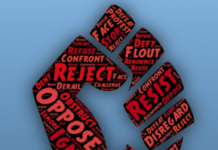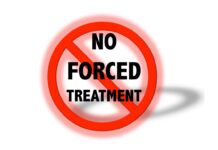Kate Millet Obituary
From The Guardian: Kate Millet, the radical feminist who launched the second wave of the women's liberation movement, died on September 6th. Millet was also...
Getting Involved in Prison Issues – Making Alliances With Mental Health Advocacy
In my recent Alternatives keynote I talked about mental health issues and our unjust prisons, including the shameful racism of the criminal justice system...
“With Coercive Control, the Abuse Is Psychological”
“Coercive control describes an ongoing and multipronged strategy, with tactics that include manipulation, humiliation, isolation, financial abuse, stalking, gaslighting and sometimes physical or sexual...
“Medicating a Prophet”
In the New York Times Sunday Review, Irene Hurford, a psychiatrist, reflects on the ethics of forced treatment for psychosis. “As doctors,” she writes,...
Six Ways You Can Really Help Prevent Suicide
The first time I tried to kill myself, I was 14. I won’t go into the indignity of being involuntarily locked up, time after time, until I satisfactorily convinced the staff that I wouldn’t harm myself or attempt suicide again. (I was lying.) The system taught me to lie, to hide my suicidal feelings in order to escape yet another round of dehumanizing lock-ups and “treatments.”
A University Ethics Scandal Turns Into a Business Opportunity
From City Pages: In a 2014 University of Minnesota research scandal, a young man was coerced into an experimental drug study conducted by his psychiatrist that...
In Praise of Defiance
From Aeon: Throughout history, psychiatry has pathologized defiance and continues to label individuals who resist authority and stand up for their rights as mentally ill....
“Autism’s Lost Generation”
“Some autistic adults have spent much of their lives with the wrong diagnosis, consigned to psychiatric institutions or drugged for disorders they never had,” Jessica Wright writes in The Atlantic.
“Forced Treatment is not the way: Opposing View”
Psychiatrist Dan Fisher's "opposing view" in USA Today makes the case — from a mental health perspective — against repealing the Affordable Care Act, which has...
“Attacks on Hoffman Report From Military Psychologists Obfuscate Detainee Abuse”
Steven Reisner and Stephen Soldz, writing for Counter Punch, take on those who have criticized the Hoffman Report, which found that the APA had actively colluded in the US Torture program. “They have not credibly refuted these core findings of Hoffman’s seven-month investigation, nor have they even attempted to do so.”
Murphy’s Mental Health Bill a Threat to Civil Liberties
In an Op-ed for the Times Union, Madeleine Ringwald explains how the Helping Families in Mental Health Crisis Act “would severely disable protection and advocacy organizations from protecting the civil, legal and human rights of people in mental health services.” “Whether you examine it through a scientific, civil rights or bottom-line lens, Murphy's bill should appall you,” she writes. “Any legislation that bolsters institutionalization at the cost of community-based services seeks not to help those with mental health needs, but help society find ways to hide, suppress and silence them.”
Ethical Failings in Experimental Drug Safety Trials
Leading human subjects ethics researcher questions exploitation of uninsured minorities in experimental drug trials.
United Nations Report Calls for Revolution in Mental Health Care
In a new report, the United Nations Special Rapporteur on the right to health, Dr. Dainius Pūras, calls for a move away from the biomedical model and “excessive use of psychotropic medicines.”
Drug Policy Alliance Member Targeted by Philippine President
From the Drug Policy Alliance: Last week, Drug Policy Alliance Board Member Dr. Carl Hart visited the Philippines to speak at a drug policy forum....
The FBI and Defense Department are Investigating UHS Hospitals
From BuzzFeed News: America's largest chain of psychiatric hospitals, United Health Services, is currently under investigation by at least three federal agencies including the FBI...
Los Angeles Increases Outpatient Involuntary Treatment in Spite of UN Declaring Force “Torture”
Even as we have access to more and more information linking that which gets labeled mental illness to trauma — treatment that exacerbates the trauma response continues to gain legal traction all over the country. This, of course, leads to the epidemic of harm and iatrogenic illness we’re watching happen. (See: Anatomy of an Epidemic.)
“Coercive Mental Health Legislation Threatens Rights of People”
“Hailed as a rare bipartisan victory, the Murphy Bill lets politicians falsely claim progress against gun violence while stigmatizing people with 'mental illness,' undermining...
Voluntary Psychiatric Patients May Face Exploitation
From WFAA: Many patients who check themselves into psychiatric hospitals voluntarily may have difficulty when attempting to check out. In one recent incident in Denton,...
Refugees and Immigrants Experience Increased Medical Coercion
Refugees and first-generation immigrants of African descent are at greater risk of experiencing medical coercion when compared to immigrants of other visible minority communities in Canada.
Open Letter to Senator Creigh Deeds
Dear Senator Deeds:
Hello from another fellow Virginian. First, I want to extend my deepest condolences for the horrific tragedy that befell your family last year, and for the loss of your precious son Gus. I think I know, at least in part, how agonizing it is when our loved ones cannot access helpful supports, and how it feels to watch in horror as they spiral downward into darkness and despair. We all agree that our mental health systems are broken. Those of us who have been down the hellish road of struggling with our mental health and have found recovery have developed a new vision that will take us forwards, not backwards. Please give us the opportunity to share that new vision with you.
“A Frenzy Of Lobbying On 21st Century Cures”
Kaiser Health News and NPR report on the immense lobbying effort aimed at passing the "21st Century Cures" Act which would fast-track FDA approval...
When Calling the Police Results in Harm, Not Help
From Slate: The death of Charleena Lyles, who was shot by the police after she called them to report a burglary, serves as a reminder...
Psychiatric Diagnosis Can Lead to Epistemic Injustice, Researchers Claim
A discussion of the role of epistemic injustice in the experiences of patients diagnosed with psychiatric disorders.
Reflecting Back on a Campaign to Stop Forced Outpatient ECT
One of the most amazing activist campaigns I have been involved in during my 40 years of protest for human rights in the mental health system, was the effort to stop the involuntary electroshock of Ray Sandford of Minnesota. Ray reached MindFreedom in the Fall of 2008, and an international human rights campaign began for him.
Investigation Reveals Alarming ECT Practices in England
Audit of ECT usage, demographics, and adherence to guidelines and legislation raises concern over its continued use.
























